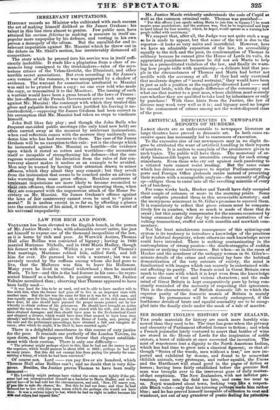LAW FOR RICH AND POOR.
VoLTAIRE has been elevated to the English bench, in the person of Mr. Justice Maule ; who, with admirable covert satire, has just set himself to expose one of the thousand inequalities of the law, as it is borne by rich 'and poor. At Warwick Assizes, Thomas Hall alias Rollins was convicted of bigamy.; having in 1830 married Marianne Nicholls, and in 1840 Maria Hadley, though his former wife was alive. Within a year or two of Thomas's first marriage, Marianne robbed him, sallied forth, and left him for ever. He pursued her with a warrant ; but was so severely treated by the ruffians among whom she had gone to live, that the Malbecco was fain to leave his Hellenore. Many years he lived in virtual widowhood ; then he married Maria. To her—and this is the bad feature in his case—he repre- sented himself as a bachelor. In passing sentence, Mr. Justice Voltaire moralized thus ; observing that Thomas appeared to have been badly used- • " It was hard for him to be so used, and not be able to have another wife to live with him, when the former had gone off to live in an improper state with another man. But the law was the same for him as it was for a rich man, and was equally open for him, through its aid, to afford relief: as the rich man would have done, he also should have pursued the proper means pointed out by law whereby to obtain redress of his grievances. He should have brought an action against the man who was living in the way stated with his wife, and he should have obtained damages; and then should have gone to the Ecclesiastical Court and obtained a divorce, which would have done what seemed to have been done already;and then he should have gone to the House of Lords, and, proving all his case and the preliminary proceedings, have obtained a full and complete di- vorce; after which he might, if he liked it, have married again."
There is a delightful smoothness in this course of easy justice for the poor. It reminds one perfectly of the London Tavern, its open doors, and the paupers that favour that elegant establish- ment with their, custom. There is only one difficulty- " The prisoner might perhaps object to this, that he had not the money to pay the expenses, which would amount to about 5001. or 6001.; perhaps he had not aa many pence. But this did not exempt him from paying the penalty for com- mitting a felony, of which he had been convicted."
' Of course not. Lord — can pay five or six hundred, which Thomas Hall alias Rollins can't; and no doubt that is very felo- nious. Besides, the Justice proves Thomas to have been really immoral- " His Lordship might perhaps have visited the crime more lightly if the pri- soner had not misrepresented himself as a bachelor to Maria Hadley, and so de- ceived her—if he had told her the circumstances, and said, ' Now, Ill marry you, f you like to take the chance,' &c. But this he had not done; and thus he had induced her to live with him upon terms which, she perhaps else would not have done. It was a serious injury to her, which he had no right to inflict because his wife and others bad injured him,"
Mr. Justice Maule evidently understands the code of Cupid as well as the common criminal code. Thomas was punished-
" For this offence [not openly asking Maria to join him in bigamy? he moat receive some punishment; and the sentence was, that he be imprisoned and kept to hard labour for four months; which, he hoped, would operate as a warning how peel* trifled with matrimony." We suspect that, after all, the Judge was not quite such a wag as he is made to appear, but that some of the wit is due to the reporter—it looks so very naive and inartificial. However, here we have an admirable exposition of the law, its accessibility equally to the rich and the poor, its condemnation of Thomas to celibacy because he cannot give the House of Lords its veils, its aggravated punishment because he did not ask Maria to help him in a premeditated violation of the law, and finally its warn- ing how people trifle with matrimony,—a delicate hint that, peo- ple in the circumstances of Thomas and Maria had better not meddle with the ceremony at all. If they had only exercised that moderate degree of " moral restraint," they would have been in just as safe a position as the regularly-divorced Lord — and , his second bride, with the single difference of the ceremony ; and what can that matter to a poor man, whose children need scarcely care whether they are qualified to take land by inheritance or only by purchase? With these hints from the Justice, the law of divorce may work very well as it is ; and bigamy need no longer be the commonest of crimes among not the worst-disposed class of the poor.


























 Previous page
Previous page